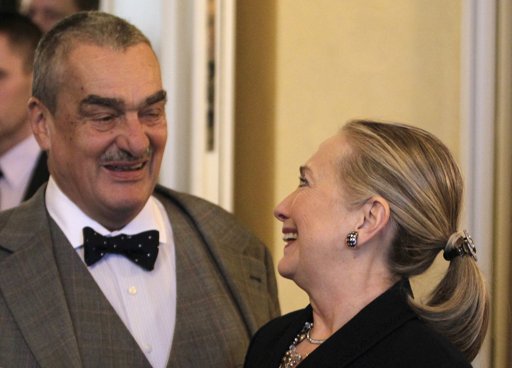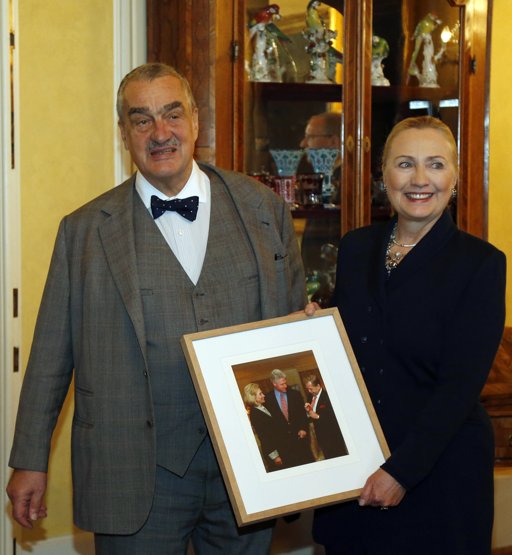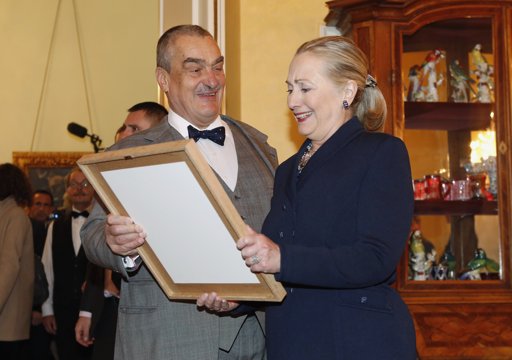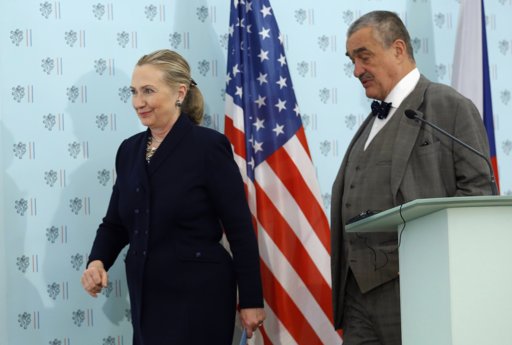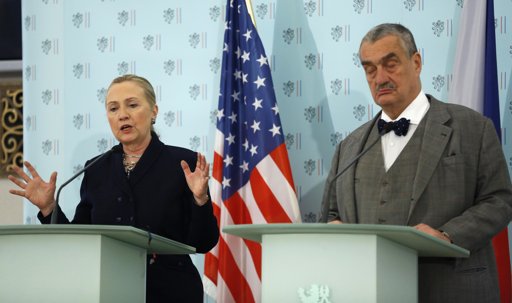emarks With Czech Republic Prime Minister Karel Schwarzenberg
Remarks
Hillary Rodham Clinton
Secretary of State
Czernin Palace
Prague, Czech Republic
December 3, 2012
FOREIGN MINISTER SCHWARZENBERG: (In Czech.)
SECRETARY CLINTON: Thank you, my friend. It is such a pleasure to be back in one of the most beautiful cities in the world and to meet with one of our strongest allies, partners, and friends on the continent.
As the minister said, our friendship dates back to the earliest days of the Czech Republic. It is based on a mutual respect and shared interests founded on three pillars – security cooperation; economic, civil-nuclear, science, and technology cooperation; and cooperation based on our shared values, particularly in the promotion of democracy and human rights around the world.
For many years, we thought primarily in a bilateral way about what we could do together with the Czech Republic. But our partnership has grown far beyond that, and today, we collaborate on global security issues, democratic transitions in the Middle East and North Africa, and so much else. So as the minister said, we covered a lot of issues today, and let me just touch on a few of the highlights.
First, our collaboration on security: In Afghanistan, hundreds of Czech troops stand with Americans and other allied nations to helped the Afghan people build a stable future for their country. We will work together to manage the drawdown on the end of combat operations in 2014 and then to support the Afghan National Security Forces beyond that, and we appreciate greatly the Czech Republic’s commitment to those.
We also are highly impressed by the new multinational training center for helicopter pilots that the Czech Republic is developing, one of the first projects in the smart defense program that NATO adopted earlier this year. And in NATO and beyond, the Czech Republic plays a key role in chemical, biological, radiological, and nuclear response. And it is expanding that leadership, for example, with a conference on the challenges posed by Syria’s weapons stockpile that was recently hosted here in Prague.
In Syria, the Czech Republic serves as the United States protecting power, which is essential for our shared effort to help the Syrian people bring an end to their suffering and the beginning of a new democratic transition. More broadly, the Czech Republic has reached out to help countries that can benefit from the very valuable experiences of this country’s transition.
We also want to emphasize greater cooperation on energy. The United States has made energy a priority in our diplomacy. We began the U.S.-EU energy dialogue because this has a major impact on everything from security to climate change. Czech and American scientists are already collaborating extensively in this field, including our effort to develop the first joint civil-nuclear center that the United States will have with a NATO ally.
And as I conveyed to the minister, the Obama Administration strongly supports Westinghouse’s bid to help expand the Temelin Nuclear Power Plant. Given how long term and strategic this investment is, the Czech people deserve the best value, the most tested and trustworthy technology, an outstanding safety record, responsible and accountable management, and job opportunities for Czech companies and workers. Westinghouse offers all of these things.
The United States wants to continue to support investments that produce tangible benefits for Americans and Czechs alike. Temelin is a perfect example, but in fact, the United States is the largest non-European foreign direct investor in the republic, and we hope to make that even bigger. Also, our work together on civil-nuclear power will spur greater cooperation between our scientists and academics and businesses on basic research and innovation.
So again, let me express my appreciation to the minister for hosting us today and to the Czech Republic for being a steadfast ally and partner. The American people have a great deal of affection and respect for how far the Czech Republic has come in the past two decades. And we will continue to support continuing progress and prosperity and our shared values that are rooted in our common experience and history. Thank you very much, Minister.
FOREIGN MINISTER SCHWARZENBERG: Thank you.
MODERATOR: (In Czech.)
QUESTION: Madam Secretary, a question on civil-nuclear cooperation. What importance do you attach to the Westinghouse bid in the Czech Republic with regards to the energy independence and security of this country?
SECRETARY CLINTON: Well, let me begin by saying that energy security and energy diversification are top issues for our foreign policies around the world. This is not just about Europe and it is certainly not just about the Czech Republic.
When it comes to civil-nuclear energy, the Czech Republic leads Central Europe both in terms of your commitment to nuclear safety and security here at home and your support for nonproliferation in the international nuclear framework. It was certainly no accident that President Obama came to Prague early in his first term to speak about the global nonproliferation agenda. And through our joint declaration on cooperation in research and development and a series of cooperative ventures that were announced last fall, we already have Americans working with their Czech counterparts to improve the efficiency of reactors and reprocessing of spent fuel, to share best practices among nuclear security experts, and we’re working to stand up a joint center for civil-nuclear cooperation in Prague.
So as I said in my opening remarks, we certainly discussed these issues. We are encouraging the Czech Republic to diversify its energy sources and suppliers in ways that are economically sustainable and environmentally sound, which is an important message for all of our European partners. And we are not shy about pressing the case for Westinghouse to expand the Temelin Nuclear Power Plant because we believe that company offers the best option for the project in terms of technology and safety. It would clearly enhance Czech energy security and further the nuclear cooperation between our two countries and it would create jobs and economic opportunity for Czechs and Americans. It will ensure that the new facility would be built to the highest international standards, using a model that has already been approved by the EU and the International Energy Agency regulators. So we clearly hope that Westinghouse will receive the utmost consideration as this process moves forward.
MODERATOR: (In Czech), New York Times.
QUESTION: Michael Gordon, New York Times. Madam Secretary, there have been reports in recent days of increased activity at Syria’s chemical weapon sites. What is the nature of this activity? Is there a basis for concern? And what would – President Obama has said that the use of chemical weapons by the Assad regime would cross a redline, but he hasn’t made entirely explicit what he would do about it. If the United States saw that Syria was preparing to use chemical weapons, would it intervene militarily to stop it? If it had begun to use chemical weapons, would it again use force to prevent it from continuing to attack its civilians?
And a question for the Foreign Minister of the Czech Republic: Your country has expertise in this area. In a post-Assad environment, if the Syrian leader was to be deposed, would your nation send its expertise and its units to Syria to help dismantle the chemical arsenal?
SECRETARY CLINTON: Well, Michael, those are a lot of questions, but they’re important questions and ones that are very much in on the minds of our Administration and likeminded countries around the world, including the Czech Republic. Because as I alluded to earlier, the Czech Republic is widely viewed as having some of the most extensive expertise and experience with chemical, biological, radiological, and nuclear matters. And they have already been consulting about what can be and should be done, both at this time and post the inevitable fall of the Assad regime.
We have made our views very clear. This is a redline for the United States. I’m not going to telegraph in any specifics what we would do in the event of credible evidence that the Assad regime has resorted to using chemical weapons against their own people. But suffice it to say, we are certainly planning to take action if that eventuality were to occur.
So we once again issue a very strong warning to the Assad regime that their behavior is reprehensible. Their actions against their own people have been tragic. But there is no doubt that there is a line between even the horrors that they have already inflicted on the Syrian people and moving to what would be an internationally condemned step of utilizing their chemical weapons.
So in talking to the Foreign Minister about this matter, we are certainly united in our warning and condemnation, and will stand with the international community in a united way should there be any evidence that the Assad regime has ignored international opinion on this important matter.
FOREIGN MINISTER SCHWARZENBERG: Just to answer your question, there are some of our people for the moment in Jordan cooperating with the neighboring Jordan forces, and evidently some American friends came here too training for event, we hope, won’t – never happen. Of course, the situation in Syria itself is rather chaotic and we can’t even exclude the case as it, by chance, one of the rebel groups would get hold of these arms. And that, of course, would be a danger as well. So this chaotic situation of a civil war is, with the existence of these kind of arms in the country, highly dangerous.
SECRETARY CLINTON: Thank you.
MODERATOR: (In Czech.)
SECRETARY CLINTON: Thank you, my friend

